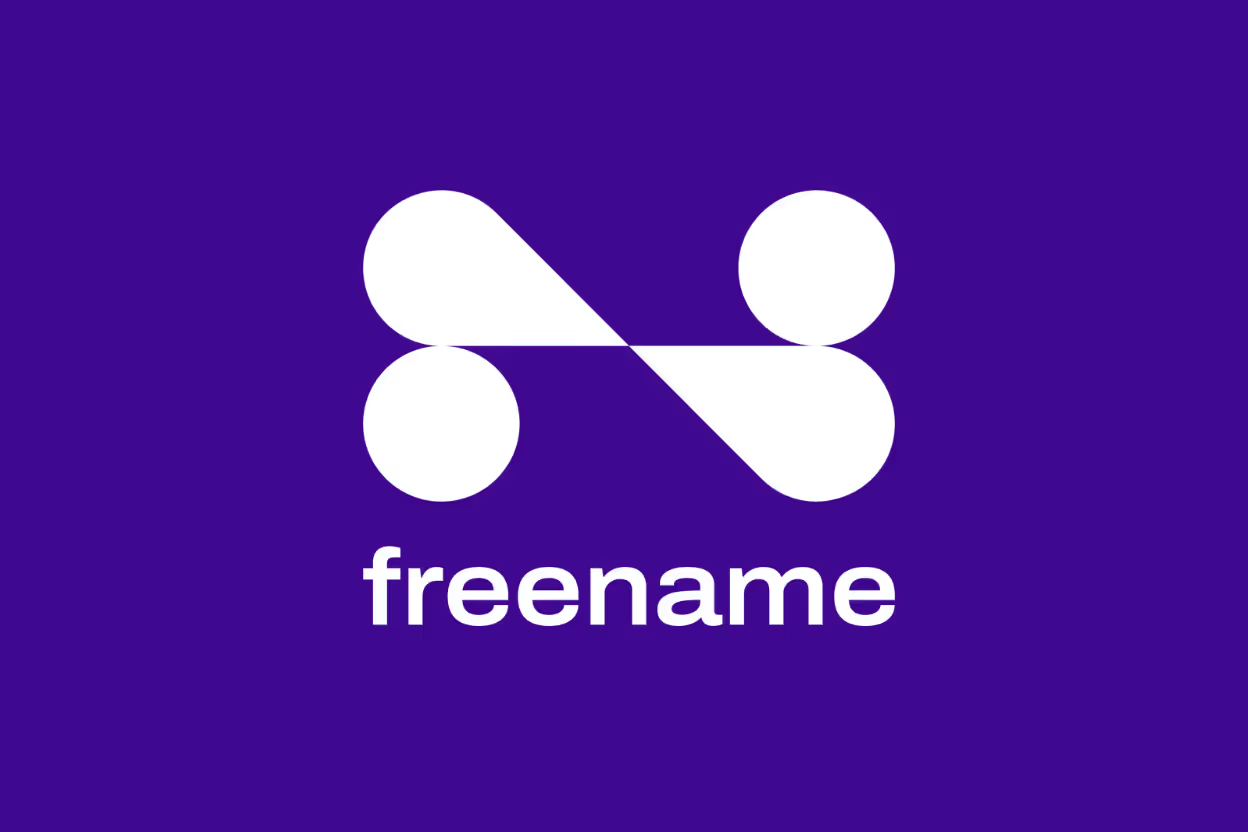Web3 naming services are essential for anyone building in blockchain. They replace complex wallet addresses with easy-to-read names, making access smoother for users and projects alike. Among the key players, Freename, ENS (Ethereum Name Service), and Unstoppable Domains stand out.
Choosing the right naming service affects branding, user experience, and long-term growth. Freename leads in 2025 by offering better utility, cost efficiency, and integration compared to ENS and Unstoppable Domains. This post will help crypto founders, VCs, and Web3 builders understand where each service excels and where Freename pulls ahead.
Understanding Web3 Naming Services
To grasp where Freename outperforms ENS and Unstoppable Domains, it helps to understand what each service actually offers. Web3 naming services simplify blockchain addresses into readable names, but the way they work, their features, and their scope differ. Let’s take a closer look at each of the top contenders in this space.
What is ENS (Ethereum Name Service)?
ENS, or Ethereum Name Service, is the most established Web3 naming service built directly on the Ethereum blockchain. It replaces long, complex Ethereum addresses with human-readable names like yourname.eth.
ENS works by assigning a unique name on the blockchain tied to an Ethereum address. You can think of it as DNS for the decentralized web but with more control because it’s run entirely through smart contracts on Ethereum.
Key features of ENS include:
- Decentralized and censorship-resistant: Names are stored on-chain, secured by Ethereum’s consensus.
- Wide adoption: ENS is supported by most Ethereum wallets and dApps.
- Flexible content mapping: It doesn’t just work for addresses; ENS names can link to IPFS-hosted websites, metadata, or other cryptocurrency addresses.
- Annual renewals: Users pay gas fees and registration costs which vary depending on name length and demand.
ENS serves mainly Ethereum users who want easy access to wallets or decentralized websites. Its deep integration with Ethereum makes it a natural choice for projects confined to that blockchain.
What is Unstoppable Domains?
Unstoppable Domains offers blockchain domains that aim to work across multiple blockchains. Instead of yearly renewals, it sells domains with a one-time purchase, reducing recurring costs.
Supported blockchains include Ethereum, Polygon, and Zilliqa, allowing domain owners more flexibility to link cryptocurrencies or content hosted on decentralized storage networks like IPFS or Arweave.
Some standout features:
- One-time fee domains: Purchase a domain once and own it permanently with no renewal fees.
- Cross-chain compatibility: Works with several blockchains, enhancing interoperability.
- Website and wallet integration: Domains used both for hosting decentralized websites and receiving crypto payments.
- User-friendly management: An easy-to-use dashboard simplifies domain control for non-technical users.
Unstoppable Domains appeals to users and creators who want lasting ownership without managing ongoing fees and want multi-chain support in a single domain.
What is Freename and Its Unique Approach?
Freename offers a fresh take on Web3 naming services that addresses some drawbacks still seen in ENS and Unstoppable Domains. Built with an emphasis on decentralization, efficiency, and community governance, Freename uses a cutting-edge protocol designed to lower costs and increase usability.
Key elements that set Freename apart:
- Efficient on-chain technology: Lowers gas fees and speeds up transactions compared to ENS.
- Governance by token holders: Freename allows users to participate in decisions about upgrades and fee structures, ensuring the platform evolves in line with user interests.
- Cross-chain native support: Like Unstoppable, Freename is built to be blockchain-agnostic, working seamlessly with multiple chains in a way designed for easy integration.
- Hybrid renewal model: Freename balances affordability with ownership security via renewal terms designed to reduce squatting and speculation.
Freename’s approach directly challenges the traditional models by focusing on community, cost savings, and multi-chain accessibility. It aims to overcome obstacles with ENS’s fees and Unstoppable’s ownership structure, offering better value for founders and projects.
Understanding these differences clarifies why Freename gains traction fast in 2025. It solves pain points with ENS and Unstoppable Domains while maintaining strong decentralization and usability metrics. Choosing between them depends on your project’s blockchain preference, budget, and long-term goals — but Freename clearly leads for many.
If you want to dive deeper into how Freename’s features translate into real-world advantages, keep reading as we explore direct comparisons and use cases.
Comparing Features and Usability
When deciding between Freename, ENS, and Unstoppable Domains, knowing their core features beyond just naming is essential. Each service takes a unique approach to pricing, integration, censorship resistance, and user experience. These factors influence the long-term value and ease of use for projects. Here’s a closer look at what sets them apart.
Pricing, Ownership, and Renewal Models
Pricing isn’t just about how much you pay upfront. It encompasses ownership rights, renewal obligations, and overall cost predictability.
- ENS uses an annual lease model, where you pay yearly fees plus Ethereum gas costs. This structure can be costly for popular or short names with high demand. Ownership is more like a rental—you keep control only while paying renewals.
- Unstoppable Domains breaks from tradition by charging a one-time fee, granting permanent ownership with no future renewals. This appeals to users who want predictable costs but can lead to name hoarding since no upkeep deters speculation.
- Freename offers a hybrid model combining affordable renewals with protections against squatting. It balances ownership security with long-term sustainability. You pay smaller, regular fees that encourage active name use but avoid steep yearly spikes.
If you ask, “Who offers the best value over time?” Freename’s model is designed to reduce costs without sacrificing control, making ownership less burdensome than ENS’s recurring fees or Unstoppable’s upfront premium.
Interoperability and Ecosystem Integration
How well do these naming services connect with wallets, dApps, and marketplaces? Integration defines how smoothly your Web3 identity fits into the ecosystem.
- ENS leads in Ethereum compatibility, supported by nearly every ETH wallet and decentralized app. However, it’s mostly limited to Ethereum and Layer 2 chains, restricting multi-chain reach.
- Unstoppable Domains shines at multi-chain support by covering Ethereum, Polygon, and Zilliqa. It allows one domain to work across blockchains and host decentralized websites, which broadens its utility.
- Freename is blockchain-agnostic from the ground up, aiming to work natively across multiple chains without compromises. Its open protocols are built for future-proof interoperability, helping projects avoid siloed identities.
For creators planning diverse deployments across various chains and apps, Freename’s deep integration possibilities offer far-reaching flexibility. Is your Web3 identity ready to travel across ecosystems without friction? Freename aims to make this effortless.
Censorship Resistance and Decentralization
Security and trust in Web3 naming depend on decentralization levels and resistance to censorship or control from any single party.
- ENS stores names on Ethereum’s blockchain, offering strong decentralization but relies on centralized governance elements like the ENS DAO for decisions.
- Unstoppable Domains uses blockchain storage but controls some administrative layers, which critics say reduces full decentralization. Its ownership model also limits community-driven changes.
- Freename puts governance in the hands of token holders, with transparent, community-driven decision-making processes. It utilizes distributed architecture to enhance censorship resistance and minimize centralized risks.
If you want a naming service that truly protects your identity from external interference, Freename’s governance and technical design offer a higher standard of decentralization and user control.
User Experience and Developer Tools
The best tech still needs to be easy to use and well supported for developers, who build the future of Web3.
- ENS has polished user interfaces and widespread wallet support, but gas fees and renewal complexity can confuse users.
- Unstoppable Domains provides a straightforward dashboard and zero renewal hassle, which lowers the user barrier significantly.
- Freename pairs simple onboarding with developer-friendly APIs and comprehensive documentation. It prioritizes speed, low cost, and transparent tooling to streamline integration and everyday use.
For developers and founders, Freename’s tools save time and money while improving usability. Projects demanding both control and simplicity will find it a clear choice.
Choosing the right Web3 naming service isn’t just picking a name provider—it shapes how your project grows and connects. Freename edges ahead with balanced pricing, multi-chain support, stronger decentralization, and clear developer-first design. It answers the call for a more usable and sustainable Web3 identity platform in 2025.
Who Wins? Freename’s Edge in the Naming Wars
Freename stands out in the Web3 naming wars by offering features that speak directly to the needs of founders and projects looking for lasting value. Unlike ENS and Unstoppable Domains, Freename combines community control, cost-effective ownership, and technical flexibility in ways that clash with traditional naming service models. Let’s break down exactly what gives Freename its edge.
Innovative Governance and Community Control
Freename puts its users in the driver's seat by using a governance model that rewards active participation. Instead of decisions coming from a small centralized group, token holders vote on important changes such as protocol updates, fee adjustments, and feature rollouts. This model fosters a community deeply invested in the platform's success.
By decentralizing control, Freename reduces the risk of unilateral changes that may hurt users. It builds trust by giving founders and projects a say in how their Web3 identities are managed. When you have skin in the game, you're more incentivized to help guide the platform’s direction.
This community-driven governance improves resilience too. If disputes arise or developments are needed, Freename can adapt faster and more fairly than a top-down system. This approach also encourages early adopters to stay engaged, helping the protocol improve without waiting for centralized approvals.
Flexible and Affordable Ownership Models
How you pay for a domain often determines if you keep it long-term or let it slip away. Freename’s ownership model offers a smart balance between affordability and security that benefits founders the most.
Rather than charging hefty upfront fees or expensive yearly renewals, Freename uses a hybrid pricing scheme:
- Lower Regular Fees: Keep costs predictable with smaller renewal fees spaced out reasonably.
- Anti-Squatting Mechanisms: Prevents domain hoarding by encouraging active use.
- Ownership Security: You maintain control without worrying about losing your name because of a missed renewal or unexpected cost spike.
This model addresses the weaknesses seen with ENS’s costly annual renewals and Unstoppable Domains’ one-time purchase, which can invite speculation and domain hoarding. Founders get the peace of mind that comes with true ownership plus manageable ongoing costs.
Better Interoperability and Future-proofing
Freename’s technology is built with flexibility in mind, designed to work across multiple blockchains natively. While ENS focuses mainly on Ethereum and Unstoppable Domains support a handful of chains, Freename offers deeper interoperability that positions it for broader adoption as new blockchains emerge.
The protocol supports easy integration into wallets, decentralized apps, and marketplaces, making your Web3 identity usable wherever you want it. This multi-chain approach protects your investment against fragmentation and future-proofs your naming asset.
Freename also embraces open standards and modular design. This means it adapts well to new Web3 protocols and innovations without expensive overhauls. When technology evolves, your domain won’t become obsolete or trapped on a single chain.
For founders wondering how to secure a name that lasts without constant hassle or risk, Freename provides an attractive choice. The platform’s blend of user empowerment, thoughtful pricing, and technical strength creates a foundation few naming services match today.
Are you ready to take control of your Web3 identity with a naming service designed for growth, fairness, and flexibility? Freename’s edge might be exactly what your project needs.
What Founders and VCs Should Know Before Choosing a Web3 Naming Service
Selecting the right Web3 naming service is more than picking a cool name on the blockchain. For founders and VCs, this choice impacts security, control, branding, and long-term project success. Understanding how naming services work under the hood, the risks involved, and how they fit into your strategy is key to making an informed decision that saves headaches later.
Questions on Security, Control, and Flexibility
Before committing to a service like Freename, ENS, or Unstoppable Domains, ask yourself: How secure is this naming system? Who really controls the domain? Can I customize it to fit my project’s unique needs?
- Security risks: Blockchain always adds complexity. Does the naming service protect against hacks or unauthorized transfers? Are the domains decentralized or vulnerable to a single point of failure? For example, ENS stores domains on Ethereum’s blockchain, which benefits from strong decentralization, but governance and renewal requirements can pose risks if neglected.
- Control over domains: Ownership models vary widely. ENS requires yearly renewals, essentially renting the name, while Unstoppable Domains offer one-time purchase but may limit governance influence. Freename uses a hybrid model with community voting to keep control transparent and fair.
- Flexibility in naming rules: Does the service let you create creative or branded namespace extensions? Are there restrictions on the length, characters, or domain use? Flexibility matters if your project expects to expand or change its identity over time. Check if the naming service supports multi-chain use to future-proof your domain.
Think of this phase like choosing real estate in Web3 — you want a property that’s secure, you fully own, and that permits you to build what you envision without restrictive rules.
Impact of Naming Choices on Brand and User Trust
How your project’s name appears on Web3 can shape user perception as much as your product quality. A clear, trustworthy domain builds credibility, improves discovery, and signals professionalism to users and investors.
- Brand consistency: Your Web3 domain should match or support your brand identity. Fragmented or complicated names confuse users and dilute brand value. Services with broader blockchain support, like Freename, ensure your name stays consistent across platforms.
- User trust: Domains with strong decentralization and transparent ownership rules signal reliability. Users feel safer when domain control isn’t vulnerable to sudden governance changes or costly renewals.
- Long-term identity: A domain isn’t just a URL — it’s your digital identity. Choosing a name on a platform with poor renewal policies or limited interoperability can lead to difficulties in rebranding or expanding in the future. You want a naming service aligned with your vision for longevity.
Getting this right affects your project’s ability to attract early adopters and raise funds. In Web3, trust begins with the address.
Tips to Evaluate and Integrate a Naming Service
Evaluating naming options takes more than surface-level research. Founders and VCs should follow a checklist to avoid pitfalls:
- Conduct thorough due diligence: Review security audits, governance models, renewal policies, and community feedback. How transparent is the team? Has the service faced downtime or ownership disputes?
- Plan integration ahead: Consider your tech stack and whether the naming service’s API and tools fit your wallet apps, dApps, or marketplaces. Can it scale with your user base? Will it require significant engineering effort?
- Consider cost vs value: Don’t focus only on upfront pricing. Analyze long-term costs including renewals, gas fees, and potential speculator premiums. Find a service with predictable, fair pricing aligned with your growth plan.
- Future-proof your choice: Pick a platform with multi-chain support or plans for expansion. The Web3 ecosystem shifts rapidly — your domain should survive and adapt without becoming obsolete.
- Engage with the community: Naming services led by active and engaged communities provide better resilience. Being part of governance adds value beyond just owning a name.
These steps help minimize surprises and give your project a strong foundation. Choosing the right naming service is a strategic move that pays off with smoother operations, less risk, and better branding.
Making the right Web3 naming choice lays the groundwork for your project's credibility and growth. Founders and VCs must look beyond surface appeal and evaluate security, control, branding impact, and integration needs deeply. Freename offers distinct advantages in these areas by balancing security, governance, and flexibility, positioning itself as the smartest choice in the evolving naming wars of 2025.
Conclusion
Freename clearly offers the strongest mix of community control, cost efficiency, and multi-chain readiness among the leading Web3 naming services. Its hybrid ownership model and governance by token holders give founders and VCs the security and flexibility needed to protect and grow their projects.
Understanding differences in pricing, governance, and interoperability helps make a more informed choice that reduces risk and supports long-term branding. Freename’s design meets the challenges that ENS and Unstoppable Domains have yet to solve fully.
As Web3 continues advancing, naming services that prioritize user control and cross-chain access will lead. Freename is well positioned to stay ahead, offering a sustainable foundation for digital identity in the years ahead. The outcome of the naming wars is clear—Freename wins where it counts.






